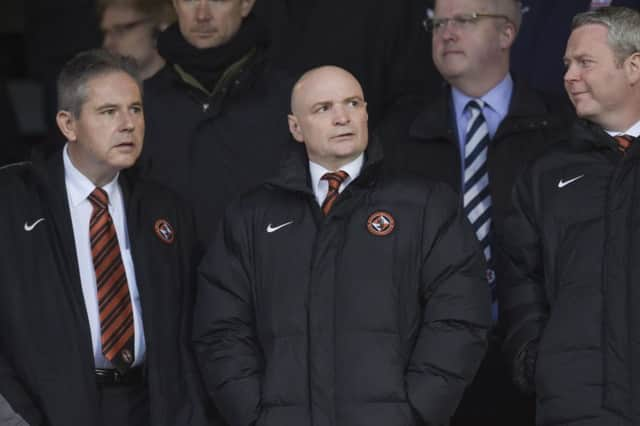Chris Hegarty: Dundee United rebuild must begin now


Instead of making hay, we have made manure. Although United’s fans have seen relegation coming for some time now, we remain in shock at the speed and the severity of our club’s decline. In just over one season, we have gone from a position of enormous strength to one in which the very future of our club is under threat. What we have witnessed is mismanagement of a magnitude that is, frankly, off the scale.
With relegation from one of the weakest Premier Leagues in living memory having been confirmed at – of all places – Dens Park on Monday; the post-mortem. Who to blame for the carnage unfolding around us? In my view, there are three central figures in this Tannadice tragedy.
Advertisement
Hide AdAdvertisement
Hide AdThe seeds of this downfall were sown by former manager Jackie McNamara. His inability to identify and address glaring gaps in the playing squad is the most immediate root cause of why we will visit Palmerston instead of Pittodrie next season. Summer recruitment was nothing short of calamitous.
A hefty budget was squandered on players such as Darko Bodul and Rodney Schneider who promptly sank without trace. Meanwhile we lined up a first-choice goalkeeper with precisely zero senior appearances under his belt. Key central defender, Jaroslaw Fojut, left and was not properly replaced. A long-term injury ruled out our best defensive midfielder, Paul Paton. We kicked off season 2015-16 with a spine made of jelly. Overseeing this debacle was chairman Stephen Thompson. The warning signs were there for all to see; and while the fans spotted them and sounded the alarm, Thompson stuck his head firmly in the sand. Bondi Beach to be precise, as he spent part of the early season just north of Sydney, flirting with an investment in an Australian club.
Criticism of the boardroom regime goes much deeper, however. Despite the club’s debt having reduced over recent years, questions remain about the persistent fragility of United’s finances.
Reported incoming transfer fees for Russell, Goodwillie, Gauld, Robertson, Armstrong, Ciftci and others total around £12 million. United’s debt peaked at £7.3m. Simple arithmetic would suggest that we should currently be sitting on a bulging biscuit tin fit to see us through the tough times ahead. Yet we are not. We remain – somehow – £1.3m in debt. Confusion remains about the detail – and in the vacuum created by a lack of open, honest explanation, speculation is rife on terraces and forums as to where the “missing millions” have gone. However the figures end up being reconciled, it seems to me that a once-in-a-generation opportunity to clear debts and build for the future has been squandered.
The third fall guy, and the one for whom I have most sympathy, is head coach Mixu Paatelainen. In taking on a demoralised, imbalanced and weak squad, entrenched at the bottom of the league, he was dealt a difficult hand. But he has played it poorly. Signings, tactics and team selections have all been questionable, and the fans’ patience has worn out. But at least he has given the impression of caring, which – in a season of precious few positives for United fans – is more than can be said for many.
Despite the gloom, some positives remain. Having spent hundreds of happy Saturdays in the company of United fans, I know they are the club’s greatest asset: good-natured, fair and, according to research by STV, the most consistently loyal in Scotland’s top flight. Their support throughout this “seasonus horribilis” has, at times, been something to behold.
Importantly, United’s followers also recognise that the club fully deserves to be relegated. There is no “divine right mentality”, and when falling into a Championship that rewards hard work, humility and togetherness, that is a good thing.
But – and it’s a big but – in order for the support to show its loyalty, and for that sense of togetherness to build, change is urgently needed. The chasm between the club’s hierarchy and its grassroots has become vast. Recent lessons from Ibrox and Tynecastle suggest that the ingredients for success in emerging from the Championship include cohesion between boardroom and fans, and a fresh, hungry squad being built by an incoming managerial team.
Advertisement
Hide AdAdvertisement
Hide AdAfter the most remarkable fall from grace, faced with the most challenging circumstances in our recent history, and with a support desperate for a cause to rally around, it is time for new leadership – both on and off the pitch. The rebuilding of this fractured, heartbroken, wonderful club must begin now.
l Chris Hegarty is a Dundee United shareholder and lifelong fan.